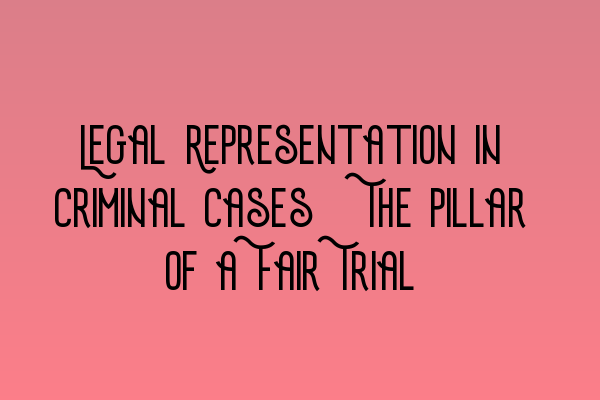Legal Representation in Criminal Cases: The Pillar of a Fair Trial
When it comes to criminal trials, legal representation plays a pivotal role in ensuring a fair and just process. The right to legal representation is not only a fundamental principle of the criminal justice system but also a constitutional right that guarantees a defendant a fair trial. In this article, we will explore the importance of legal representation in criminal cases and why it is considered the pillar of a fair trial.
The Role of Legal Representation
Legal representation in criminal cases involves the presence of a solicitor or barrister who acts on behalf of the defendant. Their primary role is to provide expert legal advice, guidance, and advocacy throughout the trial process. The solicitor acts as the first point of contact for the defendant and handles all aspects of the case, from gathering evidence to preparing a defense strategy.
One of the key responsibilities of legal representation is to ensure that the defendant’s rights are protected and upheld. They review the evidence, challenge the prosecution’s case, and seek to establish reasonable doubt regarding the defendant’s guilt. Their objective is to secure the best possible outcome for the client, whether it be an acquittal, reduced charges, or a favorable plea deal.
Legal representation also serves as an essential safeguard against injustices and unfair treatment. The presence of a skilled and knowledgeable solicitor or barrister can help level the playing field, especially for individuals who may be disadvantaged or unfamiliar with the legal system. They ensure that the defendant’s voice is heard and that their rights are not violated during the trial process.
The Importance of Legal Representation
Legal representation is crucial in criminal cases for several reasons. Firstly, it helps balance the power dynamic between the prosecution and the defendant. The prosecution is typically represented by experienced lawyers with extensive resources, while the defendant may not have access to the same level of legal expertise. Legal representation helps bridge this gap and ensures that the defendant is adequately prepared to challenge the prosecution’s case.
Secondly, legal representation ensures that the defendant has a fair opportunity to present their side of the story. A skilled solicitor or barrister can help gather evidence, interview witnesses, and build a compelling defense strategy. Without legal representation, defendants may struggle to navigate complex legal procedures, understand their rights, and effectively present their case.
Furthermore, legal representation helps protect defendants from potential abuses of power by the prosecution or law enforcement. Solicitors and barristers are trained to identify any procedural errors, violations of rights, or misconduct and bring it to the court’s attention. They serve as a crucial check and balance within the criminal justice system.
Legal Representation at SQE Criminal Law & Practice Law UK
At SQE Criminal Law & Practice Law UK, we recognize the pivotal role of legal representation in criminal cases. That’s why we offer comprehensive training programs and resources to aspiring solicitors and barristers. Our workshops and seminars on criminal practice provide the necessary expertise to excel in the field, ensuring that each legal representative is well-prepared to protect the rights and interests of their clients.
For those interested in staying informed and prepared, our updates on UK criminal laws offer valuable insights into the latest developments and changes in legislation. We understand the importance of continuous learning and providing accurate information to legal practitioners.
Mock tests for SQE Criminal Practice are also available to simulate exam scenarios and enhance your preparation for success. These tests allow aspiring solicitors and barristers to practice their skills, analyze their performance, and identify areas for improvement.
Additionally, our SQE Criminal Law study group experience aims to foster collaboration and knowledge sharing among legal professionals. By joining our study group, individuals can benefit from peer support, valuable discussions, and enhanced learning opportunities.
Conclusion
Legal representation is the pillar of a fair trial in criminal cases. It ensures that defendants have access to expert legal advice, advocacy, and protection of their rights. By bridging the gap between the prosecution and the defendant, legal representation helps level the playing field and ensures a more balanced and just process. At SQE Criminal Law & Practice Law UK, we are committed to equipping aspiring solicitors and barristers with the necessary knowledge and skills to provide effective legal representation and uphold the principles of a fair trial.
